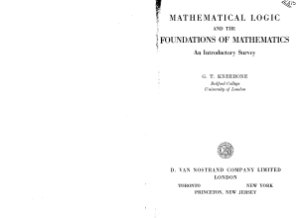Издательство Van Nostrand, 1963, -224 pp.
This introduction to mathematical logic and the philosophy of mathematics is based on courses of lectures given in the University of London, and attended both by undergraduates in the final year of an honours course in mathematics and by graduates beginning research for higher degrees. Planned with a variety of needs in mind, it is addressed both to readers who require only a general survey of the topics with which it deals and to intending specialists in mathematical logic and foundations of mathematics.
The general reader may pass quickly over sections marked with an asterisk, and he will also be able to omit many of the formal proofs in other sections without losing the thread of the main argument. No very detailed knowledge of mathematics is demanded, although a general familiarity with the concepts, terminology, and methods of mode mathematics is desirable. Readers who are not mathematicians should be able to understand, without undue difficulty, most of Parts I and III, and even to follow the broad argument of Part II; but only those with a mathematical background will be in a position to appre- appreciate all the details of the discussion.
For mathematicians who are proposing to tu to serious study of some aspect of mathematical philosophy, the book is intended as a general introduction to this entire field. It is indeed offered specifically as a preliminary survey, and not as an exhaustive account of the present state of knowledge; but anyone who has worked carefully through it, following up the suggestions for supplementary reading, should be ready to begin independent work in whatever branch of the subject he may choose. Specialized research in mathematical philosophy needs the support of a sound knowledge of the classical literature; and it is with the work of the classical phase—which in the study of the foundations of mathematics may be said to have lasted up to about 1939—that the book is for the most part conceed.
Part I Mathematical Logic
Chapter 1 Traditional Logic
Symbolic Logic I—The Propositional Calculus
Symbolic Logic II—The Restricted Calculus of Predicates
Further Development of Symbolic Logic
Part II Foundations of Mathematics
The Critical Movement in Mathematics in the Nineteenth Century
The Logistic Identification of Mathematics with Logic
Formalized Mathematics and Metamathematics
G?del's Theorems on the Inherent Limitations of Formal Systems
Intuitionism
Recursive Arithmetic
The Axiomatic Theory of Sets
Part III Philosophy of Mathematics
The Epistemological Status of Mathematics
The Application of Mathematics to the Natural World
Logic and the Activity of Thinking
Developments since 1939 in the Study of Foundations Mathematical Logic of Mathematics
This introduction to mathematical logic and the philosophy of mathematics is based on courses of lectures given in the University of London, and attended both by undergraduates in the final year of an honours course in mathematics and by graduates beginning research for higher degrees. Planned with a variety of needs in mind, it is addressed both to readers who require only a general survey of the topics with which it deals and to intending specialists in mathematical logic and foundations of mathematics.
The general reader may pass quickly over sections marked with an asterisk, and he will also be able to omit many of the formal proofs in other sections without losing the thread of the main argument. No very detailed knowledge of mathematics is demanded, although a general familiarity with the concepts, terminology, and methods of mode mathematics is desirable. Readers who are not mathematicians should be able to understand, without undue difficulty, most of Parts I and III, and even to follow the broad argument of Part II; but only those with a mathematical background will be in a position to appre- appreciate all the details of the discussion.
For mathematicians who are proposing to tu to serious study of some aspect of mathematical philosophy, the book is intended as a general introduction to this entire field. It is indeed offered specifically as a preliminary survey, and not as an exhaustive account of the present state of knowledge; but anyone who has worked carefully through it, following up the suggestions for supplementary reading, should be ready to begin independent work in whatever branch of the subject he may choose. Specialized research in mathematical philosophy needs the support of a sound knowledge of the classical literature; and it is with the work of the classical phase—which in the study of the foundations of mathematics may be said to have lasted up to about 1939—that the book is for the most part conceed.
Part I Mathematical Logic
Chapter 1 Traditional Logic
Symbolic Logic I—The Propositional Calculus
Symbolic Logic II—The Restricted Calculus of Predicates
Further Development of Symbolic Logic
Part II Foundations of Mathematics
The Critical Movement in Mathematics in the Nineteenth Century
The Logistic Identification of Mathematics with Logic
Formalized Mathematics and Metamathematics
G?del's Theorems on the Inherent Limitations of Formal Systems
Intuitionism
Recursive Arithmetic
The Axiomatic Theory of Sets
Part III Philosophy of Mathematics
The Epistemological Status of Mathematics
The Application of Mathematics to the Natural World
Logic and the Activity of Thinking
Developments since 1939 in the Study of Foundations Mathematical Logic of Mathematics

